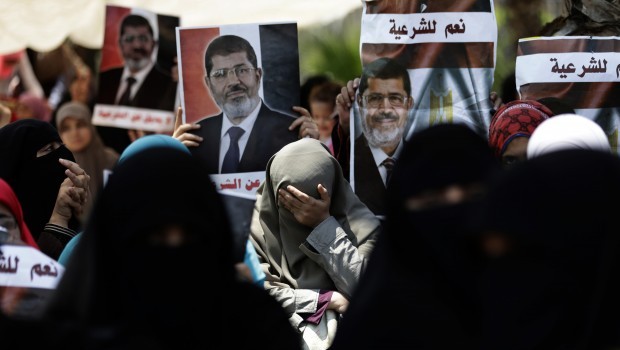Let’s leave the discussion of what happened in Egypt against president Mohammed Mursi for another time.
With regards to what happened, who was with, or against, democracy? In fact, what is real democracy?
Democracy is not a tool to be used by any one party; rather, it is a complex process.
The core and philosophical cornerstone of democracy completely contradicts the structure and texture of fundamentalism which claims to possess the absolute truth.
Few people openly recognize this. Many of those who call themselves intellectuals do not recognize this; even many of the vocal oppositionists ignore this fact in a bid to extend the opposition “front” against the authorities, in an act of pure selfishness.
This is exactly what we fear will happen, after protestors—with the help of the military—ousted Mohammed Mursi, the Muslim Brotherhood affiliated president of Egypt. Mursi was ousted after all state institutions in Egypt joined the opposition; this is not to mention the role of those who followed the victorious crowd.
Is this the end of the problem? Is Egypt now really witnessing a democratic “renaissance”?
We should be cautious about the potentially violent and vengeful backlash from Mursi’s supporters and all Islamist groups, particularly after Mursi, in his penultimate speech, expressed his willingness to defend legitimacy with his blood. Of course, legitimacy for Mursi means that his group should remain in power. Besides, we have read in Egyptian newspapers that the Muslim Brotherhood Guidance Bureau has instructed its members to draw up their wills. Moreover, Mohamed Beltagy, a senior figure in the group, announced that he would defend Mursi with his blood not to mention threats from [Al-Gama’a Al-Islamiya leaders] Tarek Al-Zumar and Assem Abdel Maged, and [Salafist preachers] Safwat Hegazy and Wagdi Ghoneim, among others.
The military appeared to be prepared for such acts, capturing several angry fundamentalist activists, as well as raiding their sectarianism-inciting channels. However, this is not the only solution; and this is not the real problem. The problem is that Mursi, like [Muslim Brotherhood founder] Hassan Al-Banna, [Muslim Brotherhood ideologue] Sayyid Qutb, and others before him, has been transformed into a new “Wailing wall” for the Muslim Brotherhood.
Yes, politically speaking, the Brotherhood has been exposed, uncovering their true puritanical face which they had previously managed to hide behind false smiles and shaky claims about democracy, dialogue, tolerance, etc.
That is true, at least for many. However, it would be wrong to say that the Muslim Brotherhood has ceased to be influential. Therefore, those monitoring the situation fear the return of the Brotherhood’s “secret apparatus”—an undercover military and security apparatus established by Hassan Al-Banna himself. The apparatus, which Al-Banna established without the knowledge of the Brotherhood leaders to be a parallel organization to the main group, was uncovered in 1948 following the so-called “Jeep” incident.
The Egyptian secret police seized an automobile which contained all of kinds of documents and evidence pertaining to this “secret apparatus”, including famous assassinations and bombings carried out during the monarchist era.
The secret apparatus’ high command was comprised of ten members, including Abdulrahman Sanadi and Mustafa Mashhour. It was under the guardianship of Mashhour that the most extremist trend within the Brotherhood emerged, including current Supreme Guide Mohamed Badie, and president Mohamed Mursi.
Unfortunately, we seem to be approaching a phase of violence and vengeance. The right solution is by creating a mature political class that is able to show real leadership in the crisis. This class should not occupy itself with seeking revenge and public support.
Finally, what is more important than the appearance of democracy is ensuring that the core of this ideology—consisting of vision, ability, and determination—become ingrained in society; everything else is immaterial.
